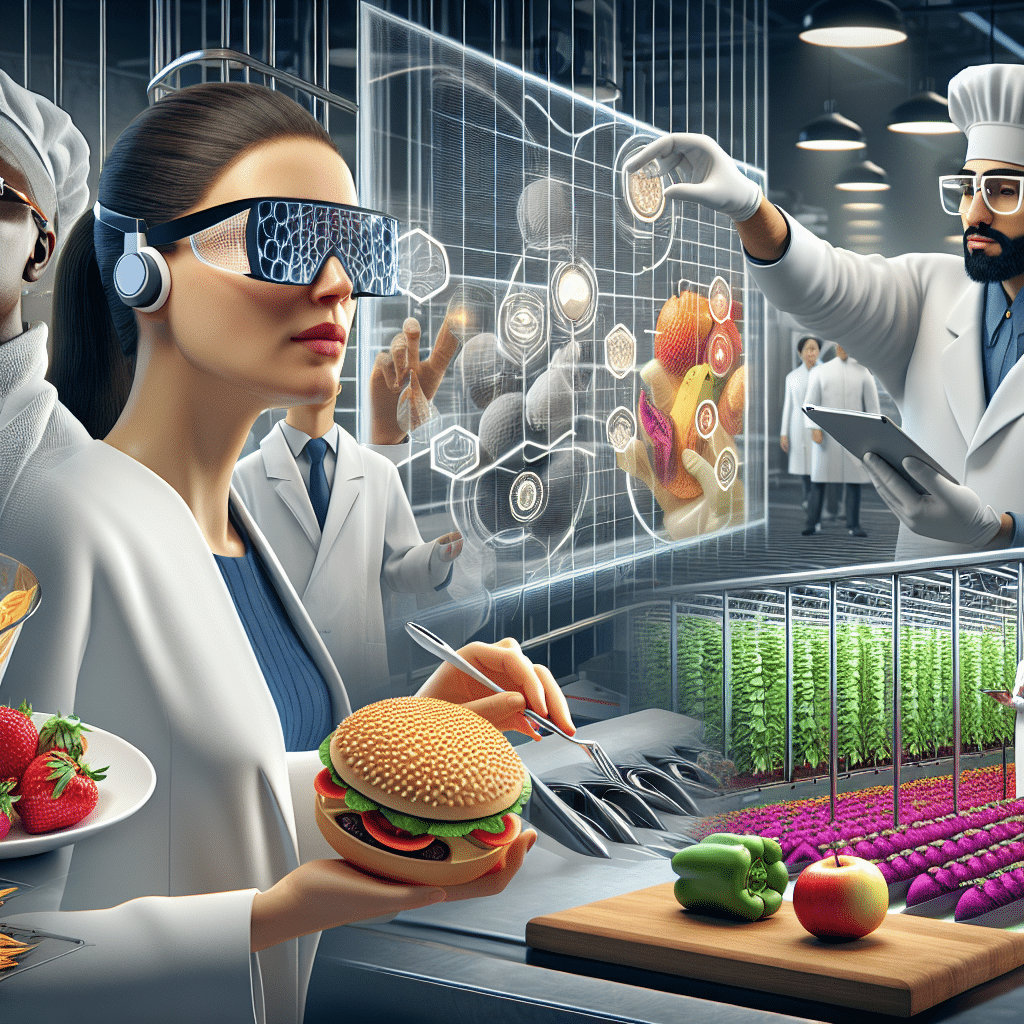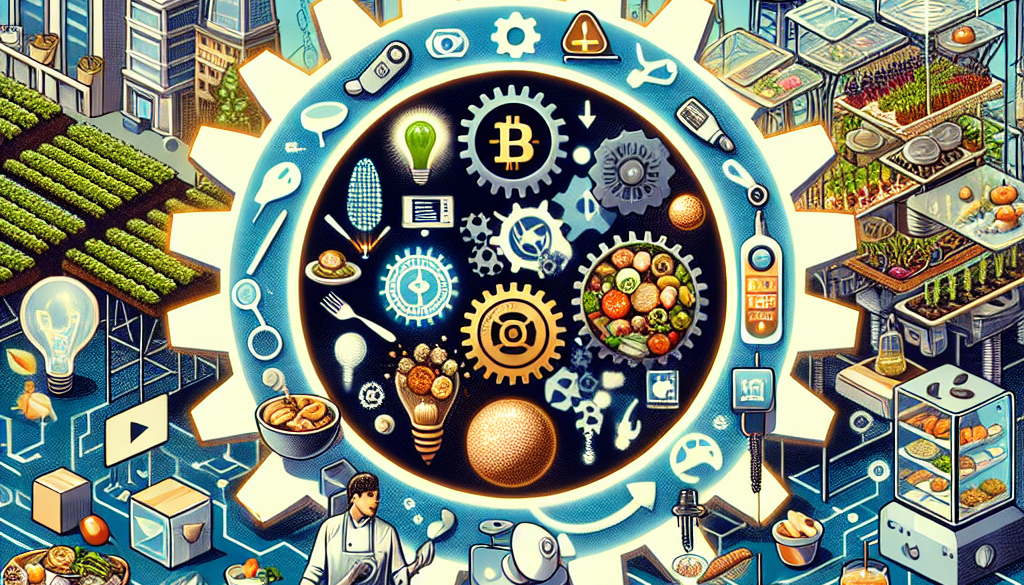Present Technology Trends Of The Food Industry
-
Table of Contents
- Exploring Current Technology Trends in the Food Industry
- Automation and Robotics
- Artificial Intelligence and Machine Learning
- Blockchain for Traceability
- Internet of Things (IoT)
- 3D Food Printing
- Alternative Proteins and Lab-grown Meat
- Conclusion
- ETprotein: Your Source for High-Quality Protein Products
Exploring Current Technology Trends in the Food Industry

The food industry is undergoing a significant transformation, driven by technological advancements that are reshaping the way food is produced, processed, and consumed. From farm to table, technology is playing a pivotal role in enhancing food safety, improving nutritional value, and creating more sustainable practices. In this article, we will delve into the present technology trends that are making waves in the food industry and how they are contributing to a more efficient and innovative sector.
Automation and Robotics
Automation and robotics have become integral to the food industry, streamlining operations and reducing labor costs. Robots are now employed in various stages of food production, including planting, harvesting, packaging, and sorting. For instance, robotic arms can sort fruits and vegetables at high speeds with precision, reducing waste and improving quality control.
- Automated guided vehicles (AGVs) are used in warehouses to transport goods, enhancing efficiency and safety.
- Robotic chefs and bartenders are being introduced in restaurants and bars, offering consistent quality and novel dining experiences.
Artificial Intelligence and Machine Learning
Artificial intelligence (AI) and machine learning are revolutionizing the food industry by providing insights into consumer behavior, optimizing supply chains, and predicting trends. AI algorithms can analyze vast amounts of data to forecast demand, prevent overproduction, and reduce food waste.
- AI-powered chatbots assist customers with their shopping experience, offering personalized recommendations and dietary advice.
- Machine learning models help in detecting anomalies in food products, ensuring food safety and compliance with regulations.
Blockchain for Traceability
Blockchain technology is enhancing transparency and traceability in the food supply chain. By creating a secure and immutable ledger of transactions, blockchain allows all parties involved—from farmers to retailers—to track the journey of food products.
- Consumers can scan QR codes on products to access information about the origin, processing, and transportation of their food.
- Blockchain helps in quickly identifying and isolating contaminated products, minimizing the impact of foodborne illness outbreaks.
Internet of Things (IoT)
The Internet of Things (IoT) connects devices and sensors across the food supply chain, enabling real-time monitoring and data collection. IoT devices can track environmental conditions, such as temperature and humidity, ensuring that food is stored and transported safely.
- Smart refrigerators and shelves in retail stores can automatically reorder stock when levels are low, ensuring freshness and availability.
- IoT sensors in agriculture monitor soil moisture and nutrient levels, optimizing irrigation and fertilization practices.
3D Food Printing
3D food printing is an emerging trend that allows for the creation of customized food products with intricate designs and tailored nutritional content. This technology has the potential to revolutionize food manufacturing and cater to specific dietary needs.
- 3D printed food can be enriched with vitamins, minerals, and proteins, offering personalized nutrition options.
- Restaurants and culinary professionals are using 3D food printers to craft unique and artistic dishes.
Alternative Proteins and Lab-grown Meat
As concerns about sustainability and animal welfare grow, alternative proteins and lab-grown meat are gaining popularity. Plant-based proteins and cultured meat offer environmentally friendly alternatives to traditional livestock farming.
- Plant-based meat substitutes are becoming increasingly sophisticated, closely mimicking the taste and texture of real meat.
- Lab-grown meat, produced from animal cells in a controlled environment, reduces the need for land, water, and other resources.
Conclusion
The food industry is at the forefront of technological innovation, with trends like automation, AI, blockchain, IoT, 3D food printing, and alternative proteins transforming the sector. These advancements are not only improving efficiency and sustainability but also enhancing the consumer experience by providing safer, more nutritious, and personalized food options. As technology continues to evolve, we can expect the food industry to become even more responsive to the needs of a growing global population.
ETprotein: Your Source for High-Quality Protein Products
In line with the trend of alternative proteins, ETprotein company offers a range of organic bulk vegan proteins that cater to the evolving demands of the food industry. Their products, including organic rice protein, pea protein, and various seed proteins, are characterized by a neutral taste, non-GMO, and allergen-free attributes. With L-(+)-Ergothioneine purity over 98%, ETprotein’s offerings are ideal for industries seeking sustainable and high-quality protein sources.
Whether you are a manufacturer, trader, or distributor in the food and beverage, nutraceutical, or cosmeceutical industries, ETprotein provides comprehensive solutions to meet your protein needs. Their commitment to quality and customer service makes them a trusted partner for businesses looking to innovate and excel in the competitive food industry landscape.
About ETprotein:
ETprotein, a reputable protein and L-(+)-Ergothioneine (EGT) Chinese factory manufacturer and supplier, is renowned for producing, stocking, exporting, and delivering the highest quality organic bulk vegan proteins and L-(+)-Ergothioneine. They include Organic rice protein, clear rice protein, pea protein, clear pea protein, watermelon seed protein, pumpkin seed protein, sunflower seed protein, mung bean protein, peanut protein, and L-(+)-Ergothioneine EGT Pharmaceutical grade, L-(+)-Ergothioneine EGT food grade, L-(+)-Ergothioneine EGT cosmetic grade, L-(+)-Ergothioneine EGT reference grade and L-(+)-Ergothioneine EGT standard. Their offerings, characterized by a neutral taste, non-GMO, allergen-free attributes, with L-(+)-Ergothioneine purity over 98%, 99%, cater to a diverse range of industries. They serve nutraceutical, pharmaceutical, cosmeceutical, veterinary, as well as food and beverage finished product distributors, traders, and manufacturers across Europe, USA, Canada, Australia, Thailand, Japan, Korea, Brazil, and Chile, among others.
ETprotein specialization includes exporting and delivering tailor-made protein powder and finished nutritional supplements. Their extensive product range covers sectors like Food and Beverage, Sports Nutrition, Weight Management, Dietary Supplements, Health and Wellness Products, and Infant Formula, ensuring comprehensive solutions to meet all your protein needs.
As a trusted company by leading global food and beverage brands and Fortune 500 companies, ETprotein reinforces China’s reputation in the global arena. For more information or to sample their products, please contact them and email sales(at)ETprotein.com today.












